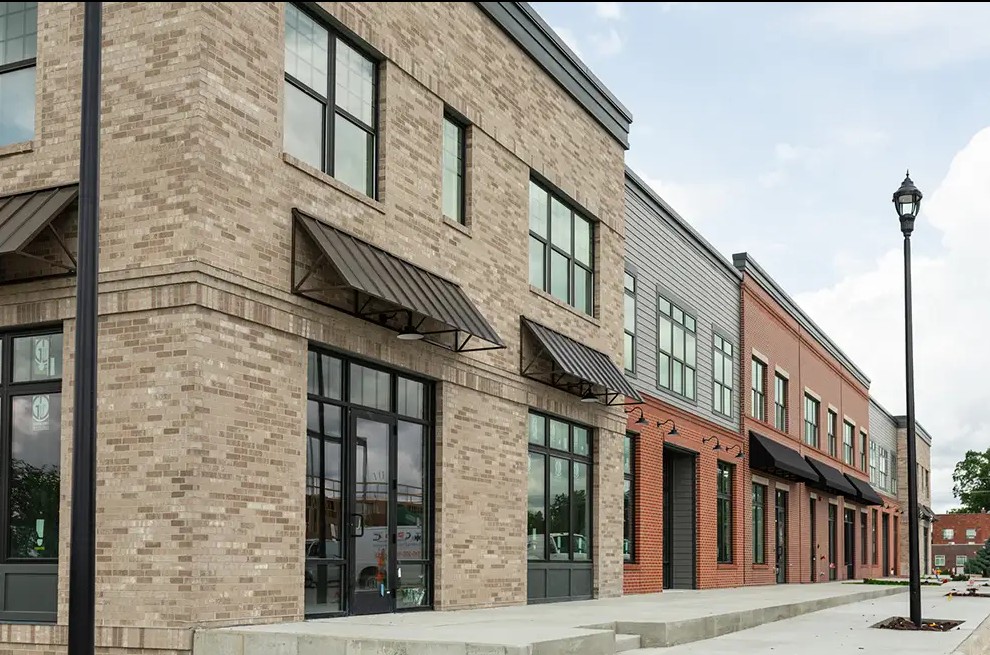Capital campaign underway to pay for historic theater’s renovations
The $3 million renovation includes plans to make the building accessible

KATHY A. BOLTEN Feb 10, 2021 | 4:25 pm
6 min read time
1,419 wordsBusiness Record Insider, Real Estate and Development
Accessibility is a key mission of the Des Moines Film Society, a nonprofit group that is buying a historic theater in Des Moines’ Drake neighborhood.
The group on Feb. 1 launched a $3 million capital campaign to renovate the century-plus-old, two-story brick building at 1207 25th St., just east of Drake University. A significant portion of the renovation will focus on making what was called the Varsity Theater accessible to people with disabilities.
“We want our community to have access to all types of films and the programs we’ll be offering,” said Michael Wagler, the Des Moines Film Society’s president. “We also want the building to be accessible.”
For much of the past year, Des Moines Film Society members have been preparing to buy the historic theater and start the fundraising campaign that will pay for renovations that include returning the structure to its original appearance and creating space for a micro-cinema on the second floor and more space on the first floor for gatherings before and after movies.
For the first time, the building, which is now called the Varsity Cinema, will be accessible.
“This building has never been accessible, and we are going to make it fully accessible,” said Ben Godar, the nonprofit group’s director. “It will be fully ADA-compliant.”
An elevator will be installed that will provide visitors access to the second floor as well as the main theater level, where the concession stand, restrooms and entrance to the auditorium will be located. Currently, the only way to get to the auditorium and restrooms is walking down two steps.
A terraced area is planned in the auditorium for people who use wheelchairs to sit.
Looking back at the Varsity’s history
The Varsity is described as the Des Moines area’s oldest single-screen, independently owned movie house. It “outlasted every competing metro movie house” and avoided being bought by movie chains, local historian James Jacobsen wrote about the theater.
The building was constructed in phases, with the first section built around 1908, Wagler said. During its first 15 years or so, the building housed auto dealerships, an auto repair shop and other vehicle-related businesses.
Around 1923, the building was converted to a Coca-Cola bottling facility. In 1938, it was purchased by a local movie theater operator who converted the structure to the Varsity Theater, Wagler said.
In 1954, Bev Mahon and Robert Fridley bought the Varsity; 21 years later, Mahon became the theater’s sole owner.
The Varsity, which during the height of its popularity attracted patrons from the Drake neighborhood and surrounding areas, ran movies headlined by John Wayne, Jimmy Stewart, Danny Kaye, Katharine Hepburn and Bette Davis. It began showing foreign-made and artistic films in the late 1970s and early 1980s.
After Mahon’s death in 2009, his daughter Denise Mahon operated the theater. She closed it in December 2018.
Capital campaign for renovation project
Last spring, the Des Moines Film Society revealed plans to buy the Varsity and reopen it as a first-run cinema that would show artistic, foreign-made and specialty films.
The nonprofit organization originally planned to start its capital campaign last summer, with the renovation project starting in the fall. The pandemic, though, delayed those plans.
The Film Society took possession of the property in November after buying it on contract from the Mahon family for $381,000, Polk County records show. While the group’s public fundraising campaign began on Feb. 1, it has been raising money for the renovation project since last summer, Godar said.
“We’ve been in this really long period of what we’ve called a ‘loud quiet’ fundraising phase,” Godar said. “In a typical environment you would have a short period where you’re building up some initial funds and then come out and announce your capital campaign.
“But with the pandemic, it delayed a lot of things.”
The group has raised nearly $1 million during the initial phase of its capital campaign, Godar said.
The group is also pursuing state historic tax credits.
Interior, exterior renovation plans
During one of several remodels of the Varsity, the exterior was painted a shade of off-white and a triangle-shaped marquee was replaced with one that was rectangular in shape. Also, a vertical fin above the marquee was removed.
The renovation will include removing the paint to expose light grayish-colored bricks with blue art-deco detailing, Wagler said. A new triangular-shaped marquee will be added, as will a vertical fin with the word “VARSITY” lit in neon lights.
“That vertical fin was a historic element of the design,” Wagler said. “It wasn’t a sign originally, but more of a vertical member that you see on a lot of historic theaters.”
Plans also include moving the concession stand, now located just inside the front entryway, to the back of the main theater. Beer and wine will be served at the concession, a new addition to the Varsity. On either side of the concession will be a set of doors that lead to a hallway where the restrooms will be located. Another set of doors will open into the theater.
“Right now, when you open the doors to the auditorium, it’s flooded with light from the outside,” Wagler said. “The double doors will keep that from happening.”
The original theater auditorium had about 600 seats; over the years, the number shrank to about 500, Wagler said. About 200 seats will be removed to accommodate the new concession area, hallway and restrooms.
“The updated theater will have about 300 seats,” Wagler said. The new seats that will be installed will be traditional movie theater seats, not the recliner styles now found in newer theaters. “That’s not a direction we want to go.”
The curved theater screen will remain, as will the 15-foot-tall curtains that span the width of the stage and are operated by power motors.
“One of things we hope to do is bring back the tradition of the curtains opening and closing at the beginning and ending of a film so we have some traditional touches to the art of film,” Wagler said. “The motors are there to operate the curtains; we just don’t know yet if they work.”
Other plans include converting second-floor space into a 40-seat micro-cinema. Movies will be shown in the second-floor area. In addition, film-related programs and lectures will be held there. Students from Drake University will be able to use the space, as will young people who attend the nearby Gregory and Suzie Burt Boys & Girls Club, Wagler said.
“It’s very exciting to be able to share this space with the community,” said Fabiola Schirrmeister, an independent media producer and member of the nonprofit group. “We are going to be able to come together again, and do great things to educate our community about films.”
History of property at 1207 25th St.
1899 Structure built to house B&S Coal and Feed Co.
April 1917 New building constructed on site. University Motor Co. occupies the building. A showroom for up to 30 vehicles is on the first floor; the second floor is devoted to repairs.
October 1918 to mid-1919 The building serves as a mess hall and canteen for the Student Army Training Corps, organized toward the end of World War I.
Mid-1919 to 1922 Two different auto dealerships occupy the building.
1922-38 Coca-Cola bottling plant moves into the building, eventually supplying bottled Coke to a 14-county area. The plant outgrows the building and moves to a facility on Keosauqua Way.
1938 Family that operates the Varsity Theater around the corner on University Avenue buys the vacant two-story brick building at 1207 25th St. A new Varsity Theater opens on Dec. 25, 1938.
1954 Bev Mahon and Robert Fridley buy the Varsity Theater.
January 1958 Fire during remodeling results in the loss of the original upper marquee.
March-April 1973 Marquee replaced with one currently on the building.
1975 Mahon has sole control of Varsity Theater.
March 2009 Bev Mahon dies. His daughter Denise Mahon begins operating the theater.
December 2018 The Varsity Theater closes.
June 2020 Des Moines City Council approves request to designate the Varsity a landmark. The designation is expected to help the property’s owners obtain state historic preservation tax credits to help with renovation costs.
November 2020 Des Moines Film Society takes possession of the property after purchasing it on contract from the Mahon family for $381,000.
Feb. 1, 2021 Des Moines Film Society launches capital campaign to raise $3 million to renovate theater.
Source: Local historian James Jacobsen and Business Record news articles










